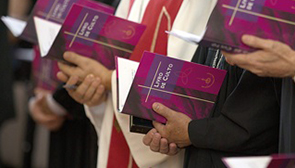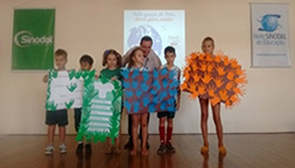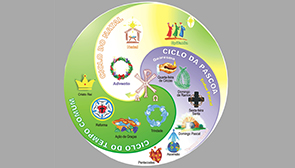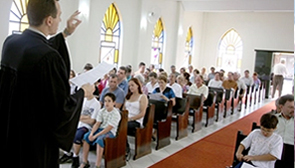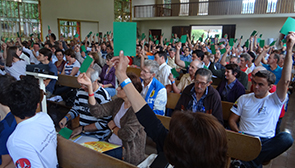
Statement on the Global Biodiversity Crisis and the Urgent Need for Structural Change
Then God said, “Let the earth put forth vegetation: plants yielding seed, and fruit trees of every kind on earth that bear fruit with the seed in it.” … And God saw that it was good. … And God said, “Let the waters bring forth swarms of living creatures, and let birds fly above the earth across the dome of the sky.” … And God saw that it was good. … And God said, “Let the earth bring forth living creatures of every kind: cattle and creeping things and wild animals of the earth of every kind.” … And God saw that it was good. Genesis 1: 11-25 (NRSV)
God loves all God’s creatures, flora and fauna, which are blessed with intrinsic beauty and goodness. Human beings, created in the likeness of God, are called to use with great care and to share equitably the resources and life systems lovingly provided by God so that all, humans and non-humans alike, may enjoy life in its fullness.
Increasingly, however, the drive for relentless expansion built into our dominant economic systems and our individual and societal obsession with material wealth are endangering the present and future wellbeing, even the survival, of many of God’s creatures. Ultimately our significant and adverse impacts on ecology will impact humanity’s own future. Already they are destroying the very basis of sustenance of our income-poor, vulnerable and Indigenous sisters and brothers, who contribute least to the ecological damage for which human beings are collectively responsible.
The recently released report of the Intergovernmental Science Policy Platform on Biodiversity and Ecosystem Services (IPBES) provides comprehensive and shocking evidence of substantial alterations and rapid ecological deterioration especially since the 1970s linked to dramatic increases in human activity. It shows that 75% of the land surface is now significantly modified, 66% of the ocean area is in critical condition, and over 85% of wetlands are gone. While the rate of deforestation has reduced somewhat since 2000, 32 million hectares of primary forest were still lost between 2010 and 2015, and deforestation continues at an unsustainable rate.
Consequently, around a million animal and plant species are now at risk of extinction.
Already more than 680 animal species have been lost in the last 500 years. The disappearance of varieties of plants and animals undermines the resilience of climate change-challenged agricultural systems, and poses a serious risk to global food security.
The report points out that underlying these disturbing trends are “production and consumption patterns, human population dynamics and trends, trade, technological innovations and local through global governance.” It finds that under current trajectories, global goals for ecological conservation will not be reached, jeopardizing progress towards attaining 35 out of 44 targets of the Sustainable Development Goals linked to poverty, hunger, health, water, climate, oceans and land.
Urging nothing less than “structural” or “transformative change”, the report at the same time offers several pathways of hope, namely: (1) promoting visions of a good life that do not entail ever-growing consumption; (2) lowering total consumption and waste, including by addressing population growth and per capita consumption contextually; (3) unleashing values of responsibility to effect new social norms for sustainability; (4) addressing income and gender inequalities which undermine capacity for sustainability; (5) ensuring inclusive decision-making, fair and equitable sharing of benefits arising from the use of resources and adherence to human rights in conservation decisions; (6) accounting for ecological deterioration in economic activities including international trade; (7) ensuring environmentally friendly technological and social innovation; and (8) promoting education, generating knowledge and maintaining different knowledge systems, not least Indigenous knowledge, noting that in areas held or managed by Indigenous Peoples, ecological decline has been less rapid or has even been avoided.
In every single area of recommended action, churches are well-placed to make significant contributions. We have the capacity and the responsibility to act.
The executive committee of the World Council of Churches, meeting in Bossey, Switzerland, on 22-28 May 2019:
Recalls the WCC statement on eco-justice and ecological debt (Geneva 2009) that challenges churches “to broaden [our] understanding of justice and the boundaries of who our neighbours are”;
Calls for continued theological reflection on what constitutes fullness of life and the sin of greed, to redefine notions of “wealth” and “prosperity”, drawing on Christian traditions and practices of asceticism, and to promote a theology of sufficiency and responsibility through deeper ecumenical and interfaith formation, and through the development and dissemination of relevant theological, spiritual, historical and liturgical materials;
Recommends a process of reflection for churches to continue to learn from the wisdom and practices of Indigenous Peoples, women, peasant and forest communities who point to ways of thinking and living gently with creation;
Urges churches to be consistent in holding governments, politicians, and corporations accountable for the destruction and pollution of land, water and air in pursuit of “development” and profit;
Encourages churches to prioritise advocacy for the replacement of Gross National or Domestic Product with alternative economic indicators that account for ecological and social impacts, as mentioned in the Ecumenical Action Plan for a New International Financial and Economic Architecture (NIFEA);
Invites churches to review the patterns of consumption in their communities, including by discussing and implementing the Roadmap for an Economy of Life and Ecological Justice.



